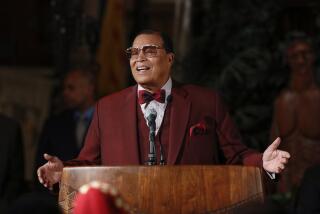Farrakhan Appeals Ban Barring Him From Britain
- Share via
LONDON — Nation of Islam leader Louis Farrakhan has asked Britain’s High Court to lift a 15-year ban on his entry into the country, arguing that it violates his right to freedom of expression.
Successive British governments have excluded Farrakhan out of fear that he would incite racial unrest. Upholding the ban last November, then-Home Secretary Jack Straw said Farrakhan’s “anti-Semitic and racially divisive views” could harm community relations.
Lawyers for Farrakhan claimed in court this week that Britain is the only country that has refused him entrance and that he has traveled around the world without stirring up trouble.
The two-day hearing ended Friday, and the court is expected to rule by the end of the month.
Defense attorney Sadiq Khan said Britain has allowed some “extremely nasty people” into the country, citing French right-wing extremist Jean-Marie Le Pen and American Ku Klux Klan members.
“He has many thousands of followers here who would like to hear him speak,” Khan said in a telephone interview Friday. “His message is as pertinent to the United Kingdom as it is to the United States.”
Britain has been rocked by race riots this summer involving young whites and British-born Asians--the term used here for Pakistanis, Bangladeshis and Indians--that were sparked in part by the activities of the ultra-right British National Party.
But Khan said the racial tensions have no bearing on his client’s case. Farrakhan wants to come to Britain to address the country’s black population, which is not involved in the rioting, Khan said.
Nicholas Blake, another lawyer who argued on Farrakhan’s behalf in the court, said his client authorized him to express regret for some of the things he said in the past. Farrakhan “recognizes the hurt some of his language has caused,” Blake said Thursday.
David Pannick, a lawyer for the government, argued in court that Farrakhan’s presence in Britain “was not conducive to the public good.”
Farrakhan’s lawyers said that were he to gain entrance to Britain, he would not talk about relations between blacks and Jews, or about American support of Israel. Farrakhan would come to promote “self-reliance, dignity and discipline” to the black community, they said.
But the Board of Deputies of British Jews, the leading Jewish organization here, said a visit by Farrakhan--no matter what his message--is unwelcome.
“Louis Farrakhan has espoused views about Jews which are deeply offensive,” said a spokesman for the group, who declined to be named. “We hope the court decides to uphold the ban.”
Columnist Deborah Orr of the Independent newspaper said Farrakhan should be allowed in.
“It is indeed an odd democracy in which purveyors of racial unrest such as the British National Party can stand for election and gain shockingly high polls, while a visitor from America capable of organizing a peaceful protest such as the Million Man March on Washington in 1995 can’t discuss his opinions with his smattering of British devotees,” Orr wrote in Friday’s paper.
She noted that the British government allowed former heavyweight boxing champion and convicted rapist Mike Tyson into the country for a lucrative prizefight last year.
This came despite rules in Britain stating that anyone convicted of a crime that carries a sentence of a year or more should be excluded unless the person can demonstrate “strong compassionate reasons” for entry.
More to Read
Sign up for Essential California
The most important California stories and recommendations in your inbox every morning.
You may occasionally receive promotional content from the Los Angeles Times.












